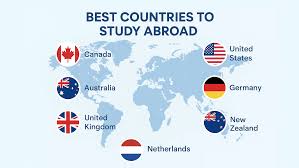Studying abroad has become a dream for many international students. But here’s the twist, most don’t just want to study, they also want to work while studying or after graduation.
Choosing the best countries for international students to study and work is no small decision, as it impacts not just academics but also career opportunities and lifestyle.
So, which countries offer the best balance of education, work opportunities, and affordability? Let’s dive in.
Why Study and Work Abroad?
Benefits of Studying Internationally
Studying abroad exposes you to different teaching styles, global networking opportunities, and a chance to develop independence.
It’s like stepping out of your comfort zone into a world full of opportunities.
See also: How to Pass JAMB Without Studying: 15 Proven Secrets You Must Know
Gaining Work Experience While Studying
Working while studying helps cover expenses and gives students hands-on experience. It’s not just about money, it’s about building a career path while studying.
Key Factors International Students Consider
When students choose a destination, these factors matter most:
- Education quality – Top-ranked universities and innovative teaching.
- Work opportunities – Ability to work during and after studies.
- Cost of living & tuition – Affordability is a big deal.
- Visa policies – Easy visa rules make life less stressful.
- Cultural experience – Adapting to a new lifestyle while learning.
United States
The US is home to Ivy League schools and tech giants. International students benefit from:
- Work opportunities through Optional Practical Training (OPT) and Curricular Practical Training (CPT).
- Part-time jobs on campus.
- High-quality education but expensive tuition.
Pros: Global recognition, endless opportunities.
Cons: High cost of living, competitive visa policies.
Canada
Canada is one of the most student-friendly destinations worldwide.
- Students can work 20 hours/week during semesters and full-time during breaks.
- The Post-Graduation Work Permit (PGWP) allows graduates to stay and work.
- Affordable compared to the US.
Pros: Welcoming culture, safe environment, permanent residency options.
Cons: Harsh winters in some regions.
Check out: Fun Debate Topics for Kids in Nigeria: 25 Exciting Ideas to Spark Young Minds
United Kingdom
The UK attracts students with its rich academic history.
- Students can work 20 hours per week during term time.
- The Graduate Route Visa allows work after graduation.
- London, Manchester, and Edinburgh are popular hubs.
Pros: World-class universities, English language advantage.
Cons: High tuition fees and living expenses.
Australia
Australia is famous for its laid-back lifestyle and top universities.
- Students can work 24 hours per week during the semester.
- Great opportunities in hospitality, retail, and customer service.
- Post-study work visas available.
Pros: High minimum wage, multicultural society.
Cons: Distance from many home countries.
Germany
Germany is a top pick for engineering and tech students.
- Many universities offer tuition-free education.
- Students can work 120 full days or 240 half-days per year.
- Strong research and innovation environment.
Pros: Low-cost education, strong economy.
Cons: Language barrier in some regions.
Read on: The 7 best university cities in Spain
France
Beyond its romance and culture, France is also an academic hub.
- Affordable tuition compared to other EU countries.
- Students can work 964 hours per year (about 20 hours per week).
- Popular for arts, humanities, and business studies.
Pros: Affordable lifestyle, rich culture.
Cons: Language challenges for non-French speakers.
Netherlands
Known for its progressive education system:
- Wide range of English-taught programs.
- Students can work part-time with work permits.
- High employability after graduation.
Pros: Internationally recognized degrees.
Cons: High cost of living in big cities.
New Zealand
A peaceful and safe environment for students.
- Work 20 hours per week during studies, full-time on holidays.
- Post-study work visa allows career growth.
- Beautiful landscapes add to the experience.
Pros: Friendly locals, good work opportunities.
Cons: Smaller job market compared to the US or UK.
Ireland
Ireland has become a hotspot for tech and finance students.
- Work 20 hours/week during term and 40 during holidays.
- Popular with multinational companies like Google and Facebook.
Pros: English-speaking, strong job market.
Cons: High living costs in Dublin.
Read also: When is the best time to study an MBA?
Sweden
Sweden focuses on innovation and creativity.
Students can work without restrictions.
High quality of life and strong global connections.
Pros: Great for research students.
Cons: High cost of living and cold weather.
Comparison Table of Top Study & Work Countries
| Country | Work While Studying | Post-Study Opportunities | Tuition Fees (Avg) |
|---|---|---|---|
| USA | Yes (CPT/OPT) | Strong | High |
| Canada | Yes (20 hrs/week) | PGWP up to 3 years | Moderate |
| UK | Yes (20 hrs/week) | Graduate Route Visa | High |
| Australia | Yes (24 hrs/week) | Work Visa Available | Moderate |
| Germany | Yes (120 days/year) | Strong for Tech/Eng. | Low/Free |
| France | Yes (20 hrs/week) | Moderate | Affordable |
| Netherlands | Yes (part-time) | High employability | Moderate |
| New Zealand | Yes (20 hrs/week) | Work Visa Available | Moderate |
| Ireland | Yes (20 hrs/week) | Strong Tech Sector | Moderate/High |
| Sweden | Yes (no limit) | Innovation-driven jobs | Moderate/High |
Tips for Choosing the Right Country
- Check visa rules carefully.
- Compare tuition fees and living expenses.
- Choose based on your career goals.
- Consider language requirements.
Conclusion
The best countries for international students to study and work all have unique advantages.
Canada offers friendly policies, Germany provides affordable education, while the US and UK deliver global prestige.
The choice ultimately depends on your career goals, budget, and lifestyle preferences.
Studying abroad isn’t just about books, it’s about building a future. Choose wisely, and the world will open its doors to you.
Read now: Public Speaking Tips for Students in Nigeria
FAQs on Best Countries for International Students to Study and Work
1. Which country is cheapest for international students?
Germany and France offer low-cost or tuition-free education.
2. Can international students work full-time abroad?
Yes, during holidays or post-study with the right visa.
3. Which country is best for PR after study?
Canada and Australia are popular for permanent residency pathways.
4. Do all countries allow students to work while studying?
Most do, but the number of hours varies. Always check visa rules.
5. Which country has the best job opportunities for students?
The US, UK, Canada, and Ireland have strong job markets for graduates.




